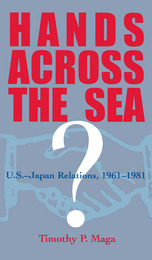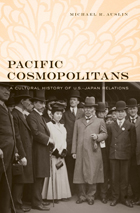
Through extensive research in a number of presidential libraries and author interviews with both American and Japanese policy-makers, Professor Maga finds a U.S.-Japan relationship forever troubled by cultural misunderstanding, America's Cold War obsession, Japanese pride, and strangely conflicting goals in both trade and defense. Given the intensity of the arguments over some of these issues, it is remarkable that Washington and Tokyo continued a working dialogue during this critical time.
Hands across the Sea? represents the first in-depth study of the modern U.S.-Japan relationship. It especially discovers how serious the U.S.-Japan disagreements over trade, defense, the direction of the Cold War, nuclear policy, and the environment had become.
Whereas American observers of U.S.-Japan relations are quick to point out their fellow countrymen's ignorance of other cultures and Japan's brilliance in analyzing American policy and life, the evidence suggests otherwise. Steering far away from anyone's political correctness, this book's bottom line involves hard-hitting investigation and analysis.

Decades before Americans cheered on Ichiro Suzuki, Japanese baseball fans swooned over Babe Ruth. And a century prior to the craze for anime and manga, American art collectors hoarded Japanese woodblock prints. Few relationships can match the depth, or importance, of the cultural ties between America and Japan over the past two hundred years. In Pacific Cosmopolitans, Michael Auslin tells this absorbing history in full for the first time.
From the moment adventurers reached each other's shores in the early 1800s, cultural encounter formed the bedrock of U.S.–Japan ties. Such casual connections turned into formal cultural exchange within the emerging global society of the late nineteenth century. As both countries became great powers, new cultural institutions supplemented political ties and helped promote economic trade, shaping the Pacific world yet becoming entangled in controversy. These trans-Pacific activities faced critics in both countries and were overwhelmed by rising nationalism and geopolitical crisis in the early twentieth century.
In the decades since World War II, however, U.S.–Japan cultural exchange has again been seen as a crucial means to strengthen the bonds between the two nations. Bringing together philanthropists like the Rockefeller family and artists like Akira Kurosawa, along with untold numbers of ordinary Americans and Japanese, the acolytes of exchange continue to believe that cross-cultural understanding will promote a more peaceful future, even in the face of competing national interests.

Ayukawa Yoshisuke (1880–1967) was the founder of the Nissan conglomerate and the leader of the Manchuria Industrial Development Corporation, one of the linchpins of Imperial Japan’s efforts to economically exploit its overseas dependencies. Despite his close association with the Japanese government from the 1920s to the 1950s, Ayukawa was a proponent of free trade and global economic interdependence. He sought to lessen state control of Japan’s economy by trying to attract foreign—especially American—capital and technology in the years surrounding World War II.
In the postwar era in particular, Ayukawa actively pushed the growth of small- and medium-sized firms, yet his efforts were ultimately unsuccessful. In Unfinished Business, through exploring the reasons for Ayukawa’s failure, Haruo Iguchi illuminates many of the economic problems of today’s Japan.
READERS
Browse our collection.
PUBLISHERS
See BiblioVault's publisher services.
STUDENT SERVICES
Files for college accessibility offices.
UChicago Accessibility Resources
home | accessibility | search | about | contact us
BiblioVault ® 2001 - 2024
The University of Chicago Press









